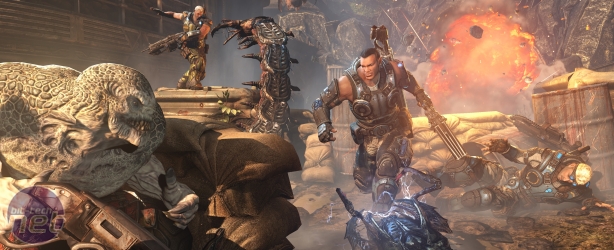
As always, the game can be experienced cooperatively and, as always, it’s generally more fun with human allies. You can opt for private or public games with up to four players online and a maximum of two on one console. Our only complaint is that when playing a public game it’s unclear who gets to decide if a mission will be ‘declassified’, and as star-ratings are based on your overall team performance, if you get grouped with some - how to put this politely - less-gifted players, it can be frustrating. AI teammates are great at staying alive and are usually quick to revive you, but they're not so good at actually killing things. Therefore, if you’re trying to go for three star-ratings, especially on the harder difficulty levels, it’s best to play with friends or solo.
In a first for the Gears series, Judgment’s enemies spawn randomly, adding unpredictability when replaying levels. But regardless of where they spawn the Locust appear in such large groups you can’t just stay stationery behind cover and expect to survive. Judgment is a more fluid game than its predecessors, requiring constant movement to succeed. You can’t get through tricky sections by learning enemy placement by rote and will have to use every flanking opportunity available, especially on the harder difficulties.

Once you’ve earned thirty stars, an extra campaign called Aftermath is unlocked. Set during the start of Gears of War 3, it doesn't have star-rankings or the option to ‘declassify’ missions. Extra content is always a good thing and bridging the gap between the two games is a nice touch, but omitting these new gameplay additions shows just how much they improve on the tired formula that reached its natural peak with the last Gears game. There’s also a noticeable graphical difference. Gears games always look great, but the rich, varied palette used in Judgment’s main campaign make Aftermath’s Gears of War 3 inspired visuals drab in comparison.
Despite the disappointment of Aftermath, Judgment’s campaign is top-notch, but multiplayer is what’s going to keep the disc in your Xbox long after every star has been earned. Wingman has sadly been done away with and the new free-for-all mode is too anarchic for our liking, but team deathmatch is enjoyable as ever, with sound balancing and logical map design, while the wave-based Survival mode is manic co-operative fun (though stripped-down compared to the Horde mode it replaces).

The highlight, however, is OverRun, which pits COG and Locust teams against each other in class-based attack and defence. As COGs, players defend two Emergence Holes (amusingly referred to as E-Holes) and then a generator, while the Locust team attempt to destroy them. COGs choose from engineer, scout, soldier, or medic class. Engineers repair damaged fortifications and lay sentry guns, soldiers replenish teammates ammo, scouts use long-ranged guns and a smart grenade that makes enemies glow red, while medics, well, you can probably guess what they do. As Locust you can be the exploding Tickers, healing Kantus, barricade-hopping Wretches, or explosive-packing Grenadiers. Then, as your team wracks up points from kills and damaging E-Holes (told you it sounds funny) a second batch becomes available, consisting of a centipede like monster and other hulking beasts.
There’s a lot of fun to be had playing as either team, though far more tactical and challenging when on the defence. Each COG class type has an important role to play and if your team isn’t playing co-operatively there’s little chance of holding out. As Locust it’s more of a free-for-all, but getting to take control of some of the second tier beasts and ploughing through the COG defences is immensely satisfying, especially as you know all too well how stressful it is for the players on the other team who are desperately trying to repel you.
Perhaps the biggest praise for Judgment’s multiplayer is its accessibility. Small teams, simple maps, varied modes and a slower pace than most shooters allows newcomers to have a decent game without being killed every two seconds. This is also true of its predecessors, but the addition of OverRun really lets players of all abilities get stuck in and be part of a concerted team effort. And perhaps the biggest praise for the game as a whole is that it doesn’t just rest on the laurels of its predecessors. While Gears of War 3 refined what came before, Judgment meaningfully adds to the experience.
In a first for the Gears series, Judgment’s enemies spawn randomly, adding unpredictability when replaying levels. But regardless of where they spawn the Locust appear in such large groups you can’t just stay stationery behind cover and expect to survive. Judgment is a more fluid game than its predecessors, requiring constant movement to succeed. You can’t get through tricky sections by learning enemy placement by rote and will have to use every flanking opportunity available, especially on the harder difficulties.

Once you’ve earned thirty stars, an extra campaign called Aftermath is unlocked. Set during the start of Gears of War 3, it doesn't have star-rankings or the option to ‘declassify’ missions. Extra content is always a good thing and bridging the gap between the two games is a nice touch, but omitting these new gameplay additions shows just how much they improve on the tired formula that reached its natural peak with the last Gears game. There’s also a noticeable graphical difference. Gears games always look great, but the rich, varied palette used in Judgment’s main campaign make Aftermath’s Gears of War 3 inspired visuals drab in comparison.
Despite the disappointment of Aftermath, Judgment’s campaign is top-notch, but multiplayer is what’s going to keep the disc in your Xbox long after every star has been earned. Wingman has sadly been done away with and the new free-for-all mode is too anarchic for our liking, but team deathmatch is enjoyable as ever, with sound balancing and logical map design, while the wave-based Survival mode is manic co-operative fun (though stripped-down compared to the Horde mode it replaces).

The highlight, however, is OverRun, which pits COG and Locust teams against each other in class-based attack and defence. As COGs, players defend two Emergence Holes (amusingly referred to as E-Holes) and then a generator, while the Locust team attempt to destroy them. COGs choose from engineer, scout, soldier, or medic class. Engineers repair damaged fortifications and lay sentry guns, soldiers replenish teammates ammo, scouts use long-ranged guns and a smart grenade that makes enemies glow red, while medics, well, you can probably guess what they do. As Locust you can be the exploding Tickers, healing Kantus, barricade-hopping Wretches, or explosive-packing Grenadiers. Then, as your team wracks up points from kills and damaging E-Holes (told you it sounds funny) a second batch becomes available, consisting of a centipede like monster and other hulking beasts.
There’s a lot of fun to be had playing as either team, though far more tactical and challenging when on the defence. Each COG class type has an important role to play and if your team isn’t playing co-operatively there’s little chance of holding out. As Locust it’s more of a free-for-all, but getting to take control of some of the second tier beasts and ploughing through the COG defences is immensely satisfying, especially as you know all too well how stressful it is for the players on the other team who are desperately trying to repel you.
Perhaps the biggest praise for Judgment’s multiplayer is its accessibility. Small teams, simple maps, varied modes and a slower pace than most shooters allows newcomers to have a decent game without being killed every two seconds. This is also true of its predecessors, but the addition of OverRun really lets players of all abilities get stuck in and be part of a concerted team effort. And perhaps the biggest praise for the game as a whole is that it doesn’t just rest on the laurels of its predecessors. While Gears of War 3 refined what came before, Judgment meaningfully adds to the experience.
-
Overall80 / 100


MSI MPG Velox 100R Chassis Review
October 14 2021 | 15:04









Want to comment? Please log in.